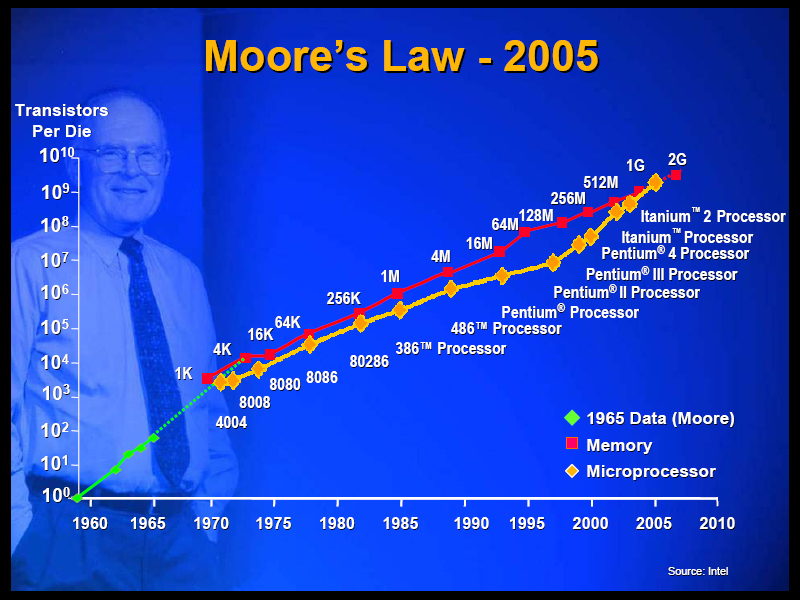Bob Colwell, Director of the Microsystems Technology Office (MTO) at the Defense Advanced Research Projects Agency (DARPA), recently made a compelling statement about the end of Moore’s Law: “When Moore’s Law ends, it will be economics that stops it, not physics. Follow the money.”
If we move beyond Moore’s Law, the progress of other industries that depend on semiconductor industry will also be slowed. The interrelation of the chip industry and this doubling of computer processing power has allowed for half a century of exponential growth. Colwell sees 7 nm as being the end of the road (although not all experts agree) and predicts that Moore’s Law will hit its limits around 2020 or 2022. It should be noted that end of Moore’s law at 7 nm happens because of its physical limits. The semiconductor industry is expecting to meet economic limits earlier than physical limits because of a transformation of the US economy from free market capitalism to monopoly capitalism.
As a result of monopoly capitalism, the consumer purchasing power of the majority in the economy has shrunk. There is a growing gap between the wages and the productivity of employees in the global economy, which has resulted into a loss of economic balance. When capitalism is reformed to a free market enterprise, and it works for all citizens in an economy, it results in an economic democracy.
In order to sustain the progress of semiconductor industry through the progress of Moore’s Law, economic reforms become critical to allow semiconductor companies to justify the ever-increasing capital-intensive investments made to sustain the progress of Moore’s law. Consider the features of mass capitalism that would help address the present economic limits of Moore’s Law:
1. Mass capitalism would ensure an economic and monetary policy in which there is no valueless hoarding of wealth by a few individuals and any valueless hoarding gets converted into valuable investments for sustaining the progress of Moore’s law.
2. It would ensure maximum utilization and rational distribution of all available resources in an economy.
3. It would optimize the business of operation for the semiconductor industry in such a way that the potential of all employees would be properly utilized towards the progress of Moore’s law.
4. It would redesign corporate human resources policies in order to encourage optimum utilization of all employees’ potential. However, organizations would also have to adjust properly to utilize that potential.
5. It would also ensure that the process of utilizing employees’ potential is not the same for all employees of the semiconductor industry. While it would encourage better methods of utilization to be continually developed, the process of utilization would be progressive in nature.
If mass capitalism comes to reality the result would be a robust growth of consumer purchasing power in an economy. By bringing back free markets, supply and demand would grow in proportion, thereby resulting in a balanced economic growth, low income taxes on individuals, higher investments, increased motivation for employees to work hard, and the growth of the overall economy. I believe that mass capitalism is the path forward for the US and global semiconductor industry in reaching the next level of innovation and financial success.
When these reforms become a reality, even if the future improvements are less from one process generation to another, the macroeconomic growth in the overall economy would be very high. Through such profound macroeconomic reforms the consumer purchasing power and hence the prosperity of overall economy would be very high. With a high economic demand, the demand for the latest and greatest electronic products will continue to grow.
Such a robust consumer demand would force semiconductor industry to make investments and manufacture products to meet the demand. In this way, mass capitalism envisions sustaining the progress of Moore’s Law in order to overcome its economic limits caused by monopoly capitalism. These reforms would usher in the era of high prosperity and replace Colwell’s hypothesis. If Moore’s law comes to an end, it will be due to physics, not economics.


Recent Comments